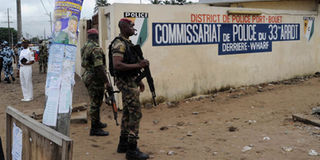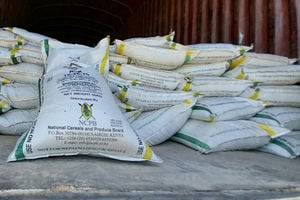I.Coast closes border with Ghana after attack: minister

PHOTO | SIA KAMBOU Ivorian soldiers stand guard on September 21, 2012, outside a police station in the south of Abidjan that was attacked by armed men late September 20.
What you need to know:
- Relations between Abidjan and Accra have been tense since a large number of politicians and members of the military of Ivory Coast's former regime under Laurent Gbagbo fled to Ghana
- However, Ghanaian President John Dramani Mahama promised during a visit to Abidjan on September 5 that his country would not become a base from where to destabilise Ivory Coast
- Ivory Coast, the world's largest cocoa producer, was seen as one of Africa's most stable states, until it descended into crisis after the 2010 elections
ABIDJAN
Ivory Coast closed its border with Ghana on Friday after armed men attacked a checkpoint and then fled to Ghana, the defence minister said.
"Around 3:00 am the position of the (government forces) at the Noe border post was attacked by armed elements from Ghana," Paul Koffi Koffi said, reading a statement from President Alassane Ouattara's office on public RTI television.
"After a shoot-out five assailants were killed and five arrested," he added. "The other assailants withdrew to Ghanaian territory."
One member of the army was slightly injured. he added.
Ouattara had informed his Ghanaian counterpart of the incident after consultations with the interior and defence ministers, he said.
The closure affects the nearly 700-kilometre (450-mile) land, sea and air border with Ghana until further notice, said the minister.
Relations between Abidjan and Accra have been tense since a large number of politicians and members of the military of Ivory Coast's former regime under Laurent Gbagbo fled to Ghana.
However, Ghanaian President John Dramani Mahama promised during a visit to Abidjan on September 5 that his country would not become a base from where to destabilise Ivory Coast.
Koffi Koffi welcomed what he called "frank cooperation" between the two neighbours, which he said had been "strengthened by John Dramani Mahama's recent visit".
Ivory Coast's security forces were last month hit by a wave of attacks in and around Abidjan and in the west of the country, attacks blamed by the authorities on Gbagbo. Gbagbo's FPI party rejected the accusation.
It was the most serious surge of violence since the end of the post-election conflict between December 2010 and April 2011 which according to a UN estimate left about 3,000 people dead.
Ivory Coast, the world's largest cocoa producer, was seen as one of Africa's most stable states, until it descended into crisis after the 2010 elections.
Fighting broke out after strongman Gbagbo refused to step down in favour of his long-time rival Ouattara, who was declared the election's winner.
Five months of unrest followed before Gbagbo was eventually arrested after forces loyal to Ouattara stormed his heavily fortified home with French and UN military backing.
Earlier Friday, Koffi Koffi travelled to the scene of a series of attacks late the previous day, in the Port-Bouet district of Abidjan.
At least three people were killed when armed men attacked three police stations late Thursday.
Those killed were a soldier, a civilian and one of the attackers, who Koffi Koffi described as bandits.




